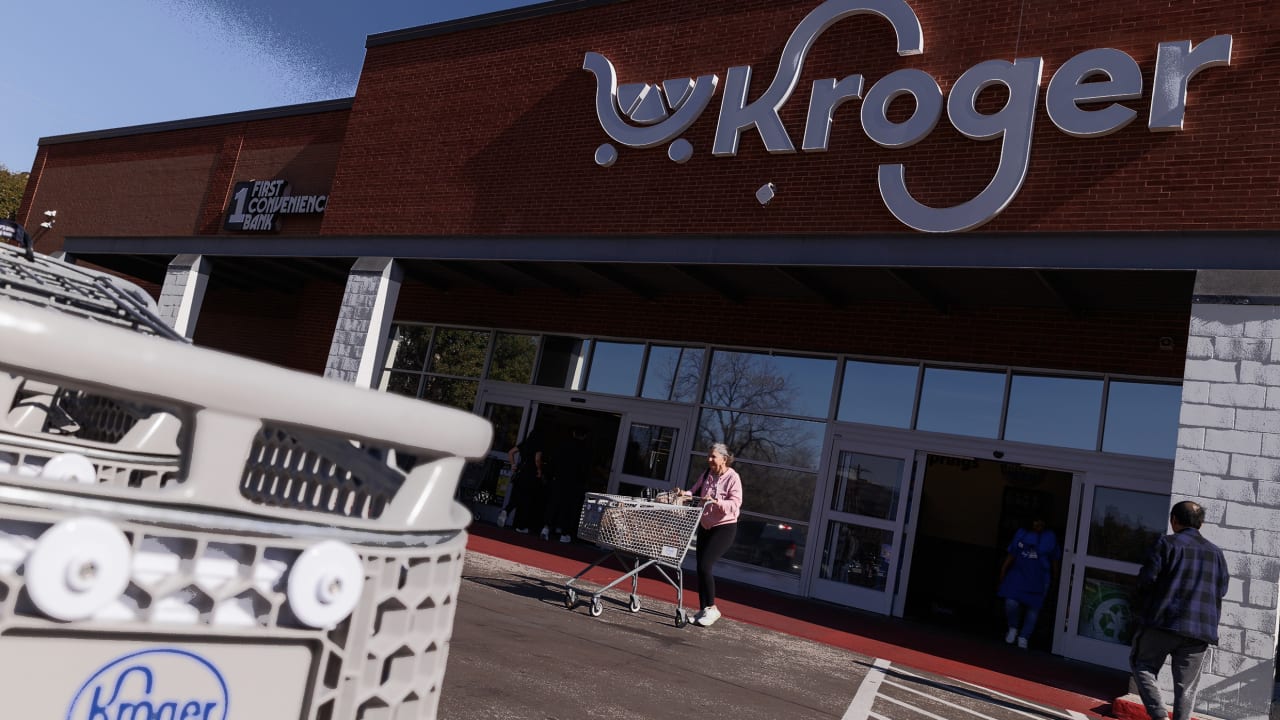How the Kroger-Albertsons merger could impact union workers, if it happens
Kroger was hoping to finally close its $25 billion acquisition of Albertsons—first announced in 2022—within the coming months. The Federal Trade Commission (FTC), however, had other plans: This week, the agency filed a lawsuit to block the deal, which would be the largest supermarket merger in U.S. history. The lawsuit, which alleges the proposed merger is anticompetitive, raising concerns that often accompany a deal of this size: that it could increase prices for consumers and depress wages for workers or lead to job cuts. “Kroger and Albertsons are sophisticated companies, and they’ve been working on this for years,” says Edward McLaughlin, an expert on food industry management and an emeritus professor at Cornell’s School of Applied Economics and Management. “They know it’s a big deal. They knew the FTC was likely to challenge it, so they had their arguments ready.” (Several states joined the FTC lawsuit, while Washington and Colorado filed their own suits to block the merger earlier this year.) What is more unexpected is the FTC’s particular focus on the potential labor implications of this deal, which could impact more than 700,000 workers in total. Labor experts say the FTC is making a unique antitrust argument, by alleging the merger would specifically reduce competition between unionized grocery workers, thereby limiting the union’s negotiating power. (Kroger and Albertsons were not immediately available for comment.)Beyond giving Kroger an upper hand in contract negotiations, the merger could especially undermine the union’s leverage during strikes, according to Risa Lieberwitz, a professor of labor and employment law at Cornell’s School of Industrial and Labor Relations. “When there’s a strike against one of the companies—for example, against Kroger—that pulls business away from Kroger and takes it to Albertsons,” she says. “That puts pressure on Kroger to comply and accede to the union’s demands in bargaining. On top of that, Albertsons is pressured to avoid a strike.” The FTC is arguing that a merger would effectively remove this kind of competition between the two workforces. (A lawsuit recently filed in Colorado alleges that the two companies already colluded with one another when workers at a Kroger subsidiary walked off the job, and that Albertsons agreed not to hire any of those workers during the strike.) And in the event of layoffs resulting from the merger, Kroger and Albertsons employees would have less influence. The union would be in a “weakened bargaining position to oppose that,” Lieberwitz says. In response to the FTC lawsuit, Kroger has denied the deal will negatively impact workers and has said the company will put $1 billion toward raising wages and improving benefits following a merger. (Lieberwitz points out that this could be done regardless, within the existing structure of collective bargaining.) Kroger claims that the deal would help the grocery giant compete with the likes of Walmart and Amazon—which McLaughlin sees as a “fatuous argument,” given how dominant Kroger already is in the market. (The company crossed $148 billion in annual sales in 2022.) This comparison is, in part, an attempt for Kroger to position itself as a superior employer to its competitors, which are largely not unionized. “As union membership continues to decline nationwide, especially in the grocery industry, this merger is the best way to secure union jobs,” the company posits in its statement on the FTC lawsuit. But Lieberwitz explains that this argument is something of a red herring. “It seems to me to be beside the point,” she says. “The argument by the FTC is that they’re looking at the [relationship] between these two companies in particular.” Antitrust experts have said that if the FTC lawsuit derails the merger, it could set a new precedent. It could also help cement the power of unions in the grocery industry and enable them to organize other workplaces. Perhaps more importantly, it goes beyond the more immediate concerns associated with a merger—such as layoffs—and raises broader questions about the long-term effects of undermining the right to strike for unionized workers. “I think it shows an innovative and creative approach,” Lieberwitz says. “The FTC’s concerns are, of course, broader, but this is a response that looks at the ways in which unionized workforces are essential to the welfare of labor and the labor market.”

Kroger was hoping to finally close its $25 billion acquisition of Albertsons—first announced in 2022—within the coming months. The Federal Trade Commission (FTC), however, had other plans: This week, the agency filed a lawsuit to block the deal, which would be the largest supermarket merger in U.S. history.
The lawsuit, which alleges the proposed merger is anticompetitive, raising concerns that often accompany a deal of this size: that it could increase prices for consumers and depress wages for workers or lead to job cuts. “Kroger and Albertsons are sophisticated companies, and they’ve been working on this for years,” says Edward McLaughlin, an expert on food industry management and an emeritus professor at Cornell’s School of Applied Economics and Management. “They know it’s a big deal. They knew the FTC was likely to challenge it, so they had their arguments ready.” (Several states joined the FTC lawsuit, while Washington and Colorado filed their own suits to block the merger earlier this year.)
What is more unexpected is the FTC’s particular focus on the potential labor implications of this deal, which could impact more than 700,000 workers in total. Labor experts say the FTC is making a unique antitrust argument, by alleging the merger would specifically reduce competition between unionized grocery workers, thereby limiting the union’s negotiating power. (Kroger and Albertsons were not immediately available for comment.)Beyond giving Kroger an upper hand in contract negotiations, the merger could especially undermine the union’s leverage during strikes, according to Risa Lieberwitz, a professor of labor and employment law at Cornell’s School of Industrial and Labor Relations. “When there’s a strike against one of the companies—for example, against Kroger—that pulls business away from Kroger and takes it to Albertsons,” she says. “That puts pressure on Kroger to comply and accede to the union’s demands in bargaining. On top of that, Albertsons is pressured to avoid a strike.”
The FTC is arguing that a merger would effectively remove this kind of competition between the two workforces. (A lawsuit recently filed in Colorado alleges that the two companies already colluded with one another when workers at a Kroger subsidiary walked off the job, and that Albertsons agreed not to hire any of those workers during the strike.)
And in the event of layoffs resulting from the merger, Kroger and Albertsons employees would have less influence. The union would be in a “weakened bargaining position to oppose that,” Lieberwitz says. In response to the FTC lawsuit, Kroger has denied the deal will negatively impact workers and has said the company will put $1 billion toward raising wages and improving benefits following a merger. (Lieberwitz points out that this could be done regardless, within the existing structure of collective bargaining.)
Kroger claims that the deal would help the grocery giant compete with the likes of Walmart and Amazon—which McLaughlin sees as a “fatuous argument,” given how dominant Kroger already is in the market. (The company crossed $148 billion in annual sales in 2022.) This comparison is, in part, an attempt for Kroger to position itself as a superior employer to its competitors, which are largely not unionized. “As union membership continues to decline nationwide, especially in the grocery industry, this merger is the best way to secure union jobs,” the company posits in its statement on the FTC lawsuit. But Lieberwitz explains that this argument is something of a red herring. “It seems to me to be beside the point,” she says. “The argument by the FTC is that they’re looking at the [relationship] between these two companies in particular.”
Antitrust experts have said that if the FTC lawsuit derails the merger, it could set a new precedent. It could also help cement the power of unions in the grocery industry and enable them to organize other workplaces. Perhaps more importantly, it goes beyond the more immediate concerns associated with a merger—such as layoffs—and raises broader questions about the long-term effects of undermining the right to strike for unionized workers. “I think it shows an innovative and creative approach,” Lieberwitz says. “The FTC’s concerns are, of course, broader, but this is a response that looks at the ways in which unionized workforces are essential to the welfare of labor and the labor market.”






















